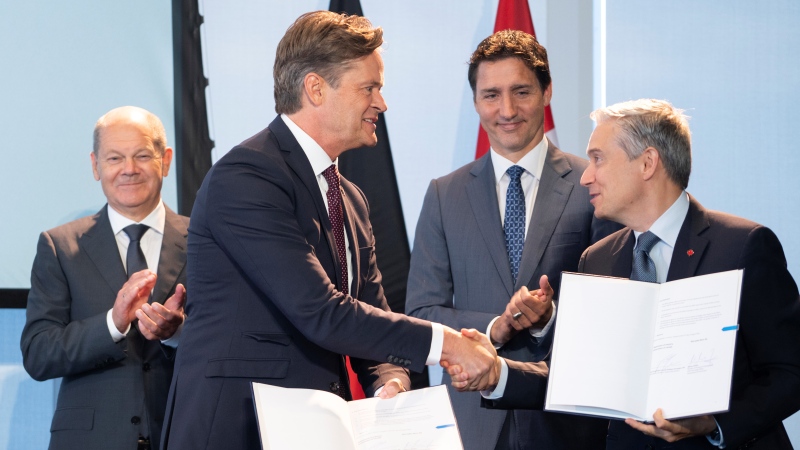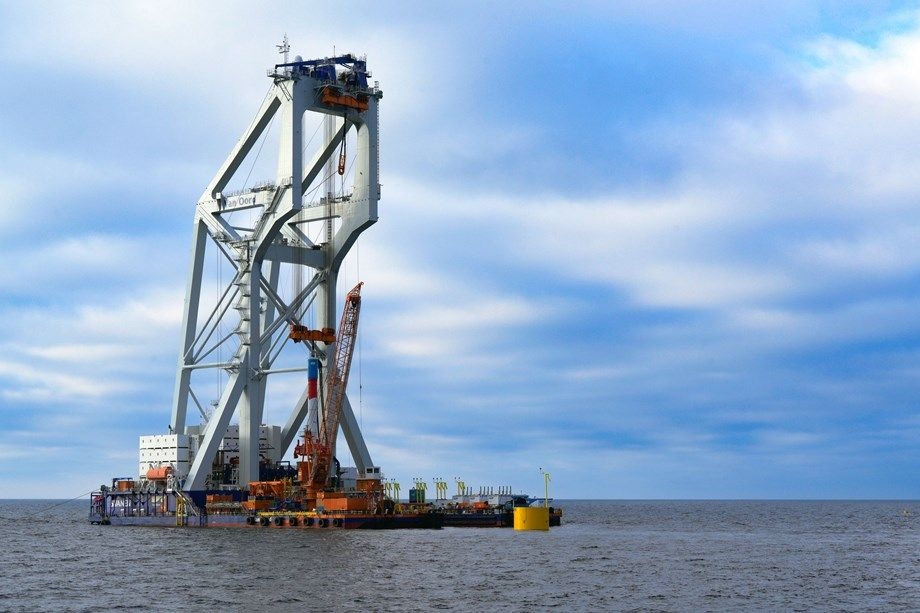As Russia continues to weaponize energy in its illegal war with Ukraine, Canada is working with European partners to strengthen global energy security and accelerate the global clean energy transition. To these ends, Canada’s allies in Europe have initiated efforts to displace imports of Russian oil and gas in the short term while accelerating efforts to deploy renewable energy and clean hydrogen. The Government of Canada is committed to supporting these efforts.

Today, Jonathan Wilkinson, Canada’s Minister of Natural Resources, and Robert Habeck, Vice-Chancellor of Germany, were joined by Canada’s Prime Minister Justin Trudeau, Germany’s Chancellor Olaf Scholz, Newfoundland and Labrador’s Premier Andrew Furey and German Ambassador Sabine Sparwasser for the signing of a Joint Declaration of Intent committing the two countries to collaboration in the export of clean Canadian hydrogen to Germany.
The Canada–Germany Hydrogen Alliance will commit the two countries to:
enabling investment in hydrogen projects through policy harmonization;
supporting the development of secure hydrogen supply chains;
establishing a transatlantic Canada–Germany supply corridor; and
exporting clean Canadian hydrogen by 2025.
The Alliance will build on Canada’s Hydrogen Strategy and mark a step toward Canada’s objective of becoming a top global supplier of clean hydrogen. This Declaration sends a clear signal to the private sector and to sub-national leaders in both countries that Canada and Germany are committed to a policy and regulatory environment that will facilitate and encourage investment in the hydrogen value chain in both countries.

Canada has a long history of private and public leadership in hydrogen innovation, including fuel cell technology. In fact, Canada is home to the largest number of hydrogen engineers in the G20. Developing hydrogen will create good, middle-class jobs, grow local economies and fight climate change. Canada will continue to leverage this advantage — along with its bounty of natural resources — to build a clean and secure energy future at home and abroad.

“Unlocking the potential of hydrogen is an essential part of our government’s plan for a sustainable economic future — not just for the domestic opportunities for emissions reductions but also for its potential as an export opportunity: to provide clean energy to countries around the globe.”
Jonathan Wilkinson
Minister of Natural Resources

“Green hydrogen is an important key for a climate-neutral economy. We must resolutely pursue climate change mitigation in order to secure our prosperity and freedom. This is more important and urgent than ever at this time. The Hydrogen Alliance between Canada and Germany is a significant milestone as we accelerate the international market rollout of green hydrogen and clear the way for new transatlantic cooperation. Specifically, we aim to build up a transatlantic supply chain for green hydrogen. The first shipments from Canada to Germany are to begin as early as 2025.”
Robert Habeck
Vice-Chancellor of Germany
Quick facts
In December 2020, the Government of Canada released the Hydrogen Strategy for Canada to provide a framework to guide actions; to stimulate investments from governments at all levels and the private sector; and to cement hydrogen’s role in Canada’s net-zero future, while also positioning Canada as a supplier of choice to the world for clean hydrogen and the technologies that use it.
In March 2021, Canada and Germany signed an energy memorandum of understanding to provide a general framework for the participants to cooperate in the energy sector, using synergies between existing bilateral and multilateral dialogues on energy and climate issues to accelerate the transition to a safe, secure, reliable, affordable and sustainable energy system in both Canada and Germany through people-to-people exchanges on best practices and knowledge, encouraging trade and investment as well as joint research, development and demonstration under the principles of mutual benefits, equality and reciprocity.















